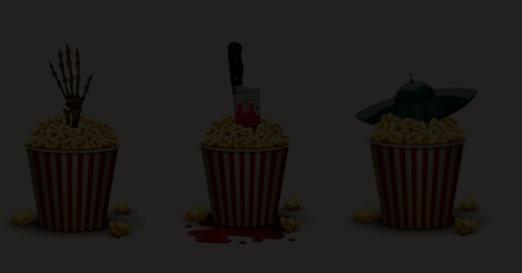I had not heard a lot about Lucky ahead of the fact. The film premiered on the Shudder streaming service on March 4th, 2021, and so, in other words, only a couple months ago (as of this writing), and I didn’t hear a lot of fanfare on its behalf. Nevertheless, the synopsis must’ve drawn me in, as I added it to my queue and subsequently forgot what it was about.
Although it will vary on whether a year-round subscription to Shudder is worth the cost of admission, given the plethora of other streaming options available, I’ve lately really taken to it. Although the supply is certainly limited, with a foundation built on older classics I’ve either already seen or decidedly ignored, every now and again you’ll discover an original film that makes it all feel worthwhile. Sometimes, too, the film you’ll discover is exactly like Lucky, where it feels obscurer and more hidden. That’s, perhaps, unfortunate for the filmmaker, but a rare treat for the moviegoer, whose now grown accustom to every film known to man coming shipped with a squishy Rotten Tomatoes percentage and devotees proclaiming it either overrated or a game-changer for the genre.
Directed by Natasha Kermani, with a screenplay by Brea Grant, Lucky is a film about a woman named May, a popular self-help author who finds herself targeted by a mysterious man.
I had forgotten about the summarization that Shudder provided for the film, and had expected a fun, but light-heart slasher film, when everything was turned on its head. You see, our mysterious man comes to poor May’s house every night and tries to kill her. Every night. Without fail. Worse yet, her husband’s completely nonchalant about it, acting like it’s no big deal and an ordinary, mundane occurrence for them. Thereafter, the premise continues to unfold. May and her husband Ted have an argument and Ted is no longer involved, leaving May by herself against their reoccurring intruder. So, too, then, for her, does it become routine, tasked with defending herself against the man in a Groundhog Day / Happy Death Day scenario.
The reviews you will find about this film are inconclusive, at best, and, as it has been with other Shudder features, the likelihood of that changing is scarce. For instance, I enjoyed Shudder’s film Spiral a lot and suspect it will be a much better film overall than the Saw sequel, but, there is a reason Twisted Pictures didn’t flinch at it. From what I have found, the critics who’ve seen Lucky are swooning over it, whereas the audience reception feels aggressively low in-comparison. It’s the type of the low that feels artificially inflated (deflated?), by individuals more bothered by the social commentary they believe it provides than the film’s actual content.
Bolstered by a strong performance by Brea Grant (both as a writer and as our protagonist), I found myself surprisingly taken by Lucky in ways I had not initially anticipated. The cinematography is slick and well-executed, with a stylistic attention to detail that had me thinking I was watching a film directed by Jordan Peele, both in the way it draws your eye to repetition and welcomes you to speculate on what’s a key detail and what isn’t. It’s a high-concept film, and smartly so, knows not to overstay its welcome and thus risk losing its novelty. The film clocks out at just eighty minutes and carries a simple, Twilight Zone style, horror short story vibe because of that.
The film is able to flex between the surrealism of itself, without every feeling like it has went too far over the edge to become lost. As a viewer, you are welcomed to laugh at the comedic value of its absurdism, having Brea play the befuddled woman as her husband and the cast of characters around her appeared to have it all figured out on a surface level. The layers of the onion begin to peel back thereafter, and the cracks, both metaphorical and literal, become readily more apparent.
Like many of the best of its subgenre – it has elements of a slasher film and dances with said tropes, but falls more inline as a psychological thriller, Lucky offers a real puzzle box of symbolisms, metaphors, and allegories to uncover. Sometimes, admittedly, they can feel a little heavy-handed or spelled out. Other times though, you’re left room for speculation and theorizing – the kind of film that leaves you coming up with explanations even after you’re neck-deep in the next film in your marathon.
The film’s commentary is open to interpretation – I’m not seriously speculating anyone bombarded bad reviews its way, but I know that if this were to reach too mainstream a crowd, I would imagine the conclusion some viewers might draw would be that they’re being “attacked”. What it comes out to, for me, is a very grim depiction, one whose connotations linger with you longer than any of the film’s bloodshed or violence will. Personally, I dug Lucky a fair bit, and it’s the type of film I’d like to see more of, more often. It’s ambitious, different than a lot of what we normally see, and I would recommend it.
![]()

